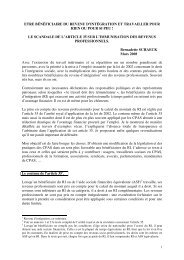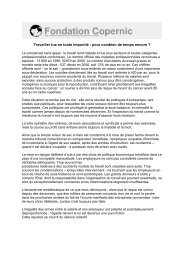Awra Amba RJ 300612 EN - Contacter un comité local d'Attac
Awra Amba RJ 300612 EN - Contacter un comité local d'Attac
Awra Amba RJ 300612 EN - Contacter un comité local d'Attac
Create successful ePaper yourself
Turn your PDF publications into a flip-book with our unique Google optimized e-Paper software.
an electric meter according to the village guides (Crespo, 2012).<br />
57 / 85<br />
4. Social organisation<br />
The family houses and all their supplies belong to the families and are managed by them (At05/52).<br />
4.5. Mutual respect and solidarity<br />
Solidarity is expressed between all the comm<strong>un</strong>ity members, in mutual respect. It is especially the<br />
case of children, who are respected by adults, but also of adults in a disadvantageous position.<br />
4.5.1. Children in <strong>Awra</strong> <strong>Amba</strong><br />
Children are respected in their bodies: no initiation rite, no corporal or severe p<strong>un</strong>ishment, no insults<br />
or injuries, no public humiliation, <strong>un</strong>like the behaviour of neighbouring traditional comm<strong>un</strong>ities<br />
(Me09/51; Crespo, 2011). In case of disobedience, the case is discussed in fortnightly family<br />
conference (see section 4.5.2), but children are quite never in situation of resistance or hostility<br />
towards adults (At05/44).<br />
Children have three very distinct duties: go to school, play, and help the comm<strong>un</strong>ity in its work<br />
(Crespo, 2011), since "our sons and daughters have the right to education and to play". In most of the<br />
collective games, boys and girls play together; they are singing and dancing also together when the<br />
heat of the day is over (At05/44).<br />
Both boys and girls begin to help in their houses from the age of 6 to 8 (At05/75). According to the<br />
survey of At05/76, children participate nevertheless 4 times less than adults to household tasks (see<br />
the ratio of average participations of children and adults in last column of Table 5 page 50). They<br />
care especially for yo<strong>un</strong>g children, and deal very few with cooking, bringing products to market and<br />
spinning.<br />
According this same survey, children participate still less to farmer tasks, on average 15 times less<br />
than adults (see last columns of Table 6 page 51). They participate mainly to land cleaning.<br />
Atnafu (2005/75 & 93) explains this low participation of children to the various tasks by the reason<br />
that parents are very permissive and make few, if any, demands to their children thanks to their age<br />
and because they are going to school. Education to the value of work does not therefore come by the<br />
way of obligation to participate actively to adult tasks, but by the way to go to school: the child is not<br />
considered as a reduced adult, but as involved in specific activities: play, go to school, and help the<br />
work.<br />
Children are not sent off alone for wood gathering for instance; adults do not let their children out of<br />
their sight. When the children go to school, located far from the village <strong>un</strong>til 2009, or come back,<br />
they make queue with the yo<strong>un</strong>ger in front, in order to be protected by the older (At05/43; Yi07/80).<br />
Girls and boys take part in the household chores almost close to parity (see section 4.3), participate<br />
equally to school activities and get equal parental treatment in all aspects (At05/93).<br />
All children attend school as long as possible according to their capacity and are encouraged to<br />
continue studying after they come home from school (Jo10b/6). "Being educated means respect and<br />
help each other in order to create brotherhood", said Zumra (Sisay, 2007).<br />
At05/88-89 states a characteristic of <strong>Awra</strong> <strong>Amba</strong>, noticed <strong>un</strong>animously by all observers, is the<br />
attachment of parents to their children. No sacrifice is too great for their children, who enjoy better<br />
living conditions than their parents (food, clothes, rest). The children and their parents have intense<br />
relationship. The children are always encouraged to express their feelings and complain to parents<br />
(At05/88-89).<br />
Both parents exercise parental authority jointly, and equally (Me09/47). Children education is<br />
nevertheless strict, because, according to Zumra, "when parents are permissive with a child, he lays it<br />
on a bit thick" (Crespo, 2011).

















